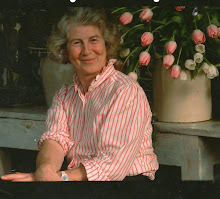This expression was much used by Welsh-speaking people during my childhood in North Wales,. They were very poor and lived very hard lives in the old farms and cottages round my home. There was no running water, and I saw the women carrying buckets with yokes from a well or the nearest stream, no heating of course, except an old black stove in the kitchen and a little coal in the parlour. The best china was often kept in a cheap and ugly glass cabinet in this front room, often exchanged for good old Welsh oak dressers and shelves which the local dealers from Chester and more prosperous areas cleared, making a good profit. The farm women loved bright lustreware and Derby with all its brilliant colours amidst all the dark brown furniture and flooring, and this was the only decoration.apart from a few photographs of weddings and religious pictures, and very gaudy wall paper, with a border below the ceiling if they could afford it. Quilts were not common in N.Wales, but the woollen blankets were pretty and very warm
In the kitchen there were often flag stones or quarry tiles which were mopped every day, and they often had odd rag rugs made from worn out clothing. In one farm I saw a strange brick built 'pen' just by the fire and was told that was where they put sick animals, but if they had a sickly child or an imbecile in the family (there were a great many because of inter-marriage with close relations or possibly incest) it was a safe, warm place for them and quite common. To send a child to a home was beyond most families. Baths were taken in big old tin washing tubs, filled by kettles from the stove and the water and soap were shared by all the family, and there always seemed to be a new baby to admire. The lavatories were all outside in little sheds and with long wooden boards with different sized seat holes, a pile of newspaper and buckets below and a supply of earth or sand. We, children, thought it was fascinating and never realised how much work and discomfort were involved in these primitive arrangements. We thought the paraffin lamps and candles were very pretty and loved the rocking chairs of the old people, and if we were lucky, were given a warm Crempog (pancake) with butter and jam dripping through our fingers. We visited them with food gifts and clothes before Christmas, and it did open my eyes to what real poverty was like.
A WELSH VILLAGE SCHOOL
We used to see the children walking down our drive to go to school, walking in the rain to catch the school bus at our lodge, and sometimes one might be missing as it was not their turn to wear the little boots they walked in. There were often 7 or 8 children in a family, though rampant T.B. took many away to sanatorias (it came from the cows milk)and my father helped to start the dairy co-operative that tested the milk and the cows and the disease was slowly obliterated. The girls mostly trained for housework in large houses and local seaside hotels where there was work for them, or worked in the local hospitals as nursing trainees. They were very small and rather pretty, and the boys, often rather wild, mostly helped on the farms with their fathers. It was a very hard life for all of them and the wives and mothers always looked worn out and strained, with child bearing and almost all suffered 'rheumatics' and back troubles in their old age.; the houses were damp and very cold all winter.. For health they were 'on the panel' with the local doctors but found the charges and cost of medicines very onerous and often put off getting help - the district nurse coped with most things and she bicycled miles with her little bag to dose the children for worms (cabbage water) endless colds and coughs, and the infectious skin complaint, empitigo which was painted with a lurid purple tincture.
I went to the local school myself and learnt quite a lot of Welsh, but found the maths, difficult enough for me in English, were more than I could manage and I was very unhappy about this, aged 5years old.
My mother took me there by car but I saw the little stove blazing bright and hot at one end of the big classroom, which had a circular guard all round it and a rail for hanging all the wet coats that the children arrived in after walking miles, and they all steamed dry during the day ready to be put on for the return walk. - no umbrellas and no gum boots! The lavatories were dark and dangerous places for the very young, and the playground was also quite an adventure and the little girls stuck to tight groups avoiding the big rough boys!



No comments:
Post a Comment